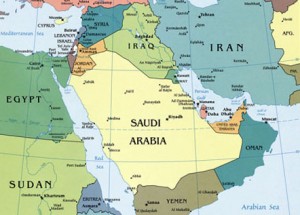Special to WorldTribune.com
ABU DHABI — Saudi Arabia and the United Arab Emirates have been identified as destabilizing Arab states.
A Qatari think tank asserted that Abu Dhabi and Riyad were trying to stop the Islamic revolt throughout the Middle East.
 The Arab Center for Research and Policy Studies said Saudi Arabia was alarmed by the prospect that the so-called Arab Spring would reach the Gulf Cooperation Council kingdom.
The Arab Center for Research and Policy Studies said Saudi Arabia was alarmed by the prospect that the so-called Arab Spring would reach the Gulf Cooperation Council kingdom.
“From the beginning, Saudi Arabia, the most conservative state in the region, viewed the Arab Spring, as a threat, prompting it to lead the counter-revolutionary axis,” the report said.
The report, which sought to explain the withdrawal of ambassadors from Qatar by Bahrain, Saudi Arabia and the UAE, said Riyad also opposed the revolt in Libya, and for six months did not intervene in the pro-democracy demonstrations against the regime of Syrian President Bashar Assad in 2011. Riyad was also said to have undermined the Islamist government of Egyptian President Mohammed Morsi in 2012.
The report, dated March 10 and titled “Recalling GCC Ambassadors from
Doha: A Background and Future Predictions,” said Saudi Arabia and the UAE
targeted two Arab League countries over the last three years. They were
identified as Tunisia and Yemen.
“Both Saudi Arabia and the UAE are playing an active role in
destabilizing the post-revolution regimes in Tunisia and Yemen, as Saudi
Arabia remains uninterested in the success of any pluralistic
political experiment that involves an alternation of power,” the report
said.
In contrast, Qatar has supported the Arab Spring as well as such
Iranian proxies as Hamas and Hizbullah. Doha was also a leading ally of the
new Islamist regimes in Egypt and Libya.
“The main challenge that Qatar constitutes to Saudi Arabia, and the
entire political system in the region, is the adoption of an independent
foreign policy from both the Saudi and Iranian axes,” the report said.
“Saudi’s government was not discouraged by the success of the Arab
revolutions in overthrowing corrupt regimes,” the report said. “Instead, it
continued to undermine the nascent democracies and veer the process of
democratic transition off course. Its greatest success in this endeavor was
in Egypt, the most contested subject with Qatar.”
The report said the UAE was not threatened by Arab Spring. Still, Abu
Dhabi adopted a “quasi-jihadist attitude” against the Muslim Brotherhood.
The UAE was also said to favor normalization with Israel.
The think tank warned that Saudi Arabia and its allies were pushing
Qatar away from the GCC. The report said Doha, despite Saudi pressure, would
not tolerate any interference in its diplomatic or domestic policy.
“Conversely, these actions could potentially move Qatar closer toward
the Iranian axis, an option that was not on the table even in far more
difficult times in the past, especially after it became
evident that bowing to pressure only leads to further demands, and that
there are some that accept nothing less than complete surrender,” the report
said.

You must be logged in to post a comment Login